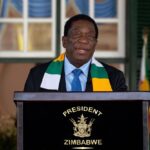Harare – President Emmerson Mnangagwa’s decision to retire Lieutenant General Anselem Nhamo Sanyatwe from his command of the Zimbabwe National Army (ZNA) and appoint him Minister of Sport, Recreation, Arts and Culture has sent ripples through the political landscape, igniting fierce speculation about the President’s motives and the implications for Zimbabwe’s stability.
The move, announced on Tuesday by Chief Secretary to the President and Cabinet Martin Rushwaya, comes just days before planned mass protests against the government and amid intensifying power struggles within the ruling Zanu-PF party, raising concerns about a potential escalation of tensions and a volatile political climate.
Rushwaya’s statement confirmed the immediate nature of the changes, invoking constitutional and legal provisions to justify the President’s actions.
“In terms of section 216 (2) (Command of Defence Forces) as read with section 340 (1) (f) of the Constitution of Zimbabwe and section 115 (Commander in Chief Prerogative) of the Defence Act [Chapter 11:02], the President, in His capacity as such and as Commander in Chief of the Defence Forces has relieved and retired, Lieutenant General Anselem Nhamo Sanyatwe, from the Zimbabwe Defence Forces and as Commander of the Zimbabwe National Army with immediate effect,” Rushwaya declared.
He further stated, “In terms of section 104 (3) of the Constitution, [the President] appoints Lieutenant General (Rtd) Anselem Nhamo Sanyatwe as Minister of Sport, Recreation, Arts and Culture with immediate effect.”
The appointment sees Sanyatwe stepping into the shoes of Kirsty Coventry, the newly-elected International Olympic Committee president, who Rushwaya confirmed had been relieved of her portfolio to focus on her global sporting role. While the official line portrays a smooth transition of power, analysts and insiders suggest a more complex narrative is at play.
A Strategic Manoeuvre to Weaken Chiwenga’s Grip?
Behind the veneer of routine government reshuffling lies a widely held belief that Mnangagwa’s decision is a calculated manoeuvre to strategically weaken the influence of his Vice-President, Constantino Chiwenga. The two are believed to be engaged in a fierce and increasingly public power struggle over the future leadership of Zanu-PF, with both factions vying for control of the party and, ultimately, the country.
Sources within Zanu-PF have revealed that high-level consultations have been ongoing in recent weeks to reconfigure Mnangagwa’s Cabinet, a process that has already seen several adjustments since the disputed 2023 elections. These consultations, according to insiders, have focused on identifying and removing individuals perceived as loyal to Chiwenga, replacing them with figures more aligned with Mnangagwa’s own faction.
Some analysts believe that the President is attempting to reassert his control over the army, traditionally a key power broker in Zimbabwean politics, to ensure its loyalty and prevent any potential military intervention in the event of widespread unrest. By removing Sanyatwe, a figure closely associated with Chiwenga, Mnangagwa may be seeking to install a more pliant commander who will follow his orders without question.
Succession Wars and the “Agenda 2030” Divide
The underlying tensions within Zanu-PF are further complicated by a growing divide over the party’s future direction and ideological orientation. Chiwenga’s faction is believed to oppose what they perceive as a “neoliberal” agenda being pushed by Mnangagwa and his allies, particularly the “Agenda 2030” proposal, which they view as a threat to Zimbabwe’s sovereignty and traditional values.
This ideological clash has further intensified the power struggle between the two factions, with both sides seeking to consolidate their control over key institutions and influence within the party. The removal of Sanyatwe is therefore seen as part of a broader strategy by Mnangagwa to marginalise Chiwenga’s faction and ensure the dominance of his own agenda.
The potential appointment of Tapfumaneyi, a figure closely associated with the CIO and known for his loyalty to Mnangagwa, would further consolidate the President’s control over the security apparatus and weaken Chiwenga’s influence.
A Demotion or a Strategic Repositioning?
While Sanyatwe’s appointment as Minister of Sport, Recreation, Arts and Culture may appear to be a promotion on the surface, many observers view it as a thinly veiled demotion. The sports ministry, while important, lacks the political clout and strategic significance of the ZNA command, leading to speculation that Sanyatwe has been effectively sidelined from the inner circles of power.
Moreover, Sanyatwe’s background as a military commander with limited experience in sports or cultural affairs raises questions about his suitability for the role. Some critics have suggested that the appointment is a cynical attempt to appease Sanyatwe and prevent him from becoming a source of opposition to Mnangagwa’s leadership.
Adding another layer of intrigue to the situation, one source has indicated that a proposal has been made to give Sanyatwe’s wife, Chido Sanyatwe, a full ministerial portfolio, potentially removing her from her current position as deputy minister in the Home Affairs ministry, where she is believed to wield considerable influence over the police force. This move could be interpreted as an attempt to further consolidate Mnangagwa’s control over the security apparatus and prevent any potential challenges to his authority.
Sanyatwe’s Controversial Past and the Shadow of August 1, 2018
Sanyatwe’s career has been marked by both loyalty and controversy, casting a long shadow over his appointment as a government minister. As the former commander of the Presidential Guard, he played a crucial role in ensuring Mnangagwa’s ascendancy to power in the November 2017 coup that ousted the late former President Robert Mugabe.
However, Sanyatwe’s legacy is also inextricably linked to the events of August 1, 2018, when soldiers under his command opened fire on unarmed protesters in Harare, killing at least seven people and injuring dozens more. The incident, which occurred in the aftermath of disputed elections, drew widespread condemnation from both domestic and international observers, tarnishing Zimbabwe’s image and raising serious questions about the government’s commitment to human rights and democratic principles.
Sanyatwe has consistently denied responsibility for the killings, claiming that his troops were acting in self-defence against violent protesters. However, his role in the events of August 1 remains a subject of intense scrutiny and controversy, and his appointment as a government minister is likely to reignite calls for accountability and justice for the victims of the shootings.
In July 2019, Sanyatwe and his wife Chido were placed on a sanctions list by the United States government for his alleged involvement in the August 1 killings. The US State Department stated that Sanyatwe was being sanctioned “due to his involvement in gross violation of human rights.”
A Nation on Edge: The Looming Protests and the Threat of Instability
As Zimbabwe teeters on the brink of mass protests, the political machinations within Zanu-PF and the military establishment are raising concerns about the country’s stability and future. The planned demonstrations, organised by various civil society groups and opposition parties, are intended to express public anger over the government’s failure to address the economic crisis, tackle corruption, and uphold democratic freedoms.
The war veterans, a key auxiliary component of the army and a powerful force within Zanu-PF, have added their voice to the growing chorus of discontent, calling for Mnangagwa’s resignation and accusing him of nepotism, corruption, and incompetence. Their support for the protests raises the spectre of a potential split within the ruling party and the military, further destabilising the political landscape.
With memories of the November 2017 coup still fresh in the minds of many Zimbabweans, there are fears that the escalating tensions between Mnangagwa and Chiwenga could lead to another military intervention, plunging the country into further turmoil. The removal of Sanyatwe, a key figure in the military establishment, has only heightened these anxieties, raising questions about the loyalty of the armed forces and their potential role in the unfolding political drama.












